I am having difficulty translating an algorithm from C to R. It's about Kolmogorov Smirnov test, and more specifically the KS probability function

In 'Numerical Recipes in C', 'probks', it's coded as
#include <math.h>
#define EPS1 0.001
#define EPS2 1.0e-8
float probks(float alam)
/*Kolmogorov-Smirnov probability function.*/
{
int j;
float a2,fac=2.0,sum=0.0,term,termbf=0.0;
a2 = -2.0*alam*alam;
for (j=1;j<=100;j++) {
term=fac*exp(a2*j*j);
sum += term;
if (fabs(term) <= EPS1*termbf || fabs(term) <= EPS2*sum) return sum;
fac = -fac; /*Alternating signs in sum.*/
termbf=fabs(term);
}
return 1.0; /* Get here only by failing to converge. */
}
I don't know how to handle the translation in R of the few last lines, all I have nowe is
PROBKS <- function(lambda) {
EPS1 <- 0.001; EPS2 <- 1.0e-8;
sum <- 0.0; fac <- 2.0; termbf <- 0.0;
a2 <- -2*lambda*lambda
for (j in 1:100) {
term <- fac * exp(a2*j*j)
sum <- sum + term
if ( (abs(term) <= EPS1*termbf) || (abs(term) <= EPS2*sum) ) {
break
} else {
fac <- -fac
}
}
termbf <- abs(term)
return(sum)
}
but this produces a non-monotonic probability function

where it should be $Q_KS(0) = 1$ and $Q_KS(\infty) = 0$. Obviously, it's about how to interpret/encode the last 'if' statement.
Any help would be very appreciated. M
EDIT 1: Here my session info
> sessionInfo()
R version 3.4.4 (2018-03-15)
Platform: i386-w64-mingw32/i386 (32-bit)
Running under: Windows >= 8 x64 (build 9200)
Matrix products: default
locale:
[1] LC_COLLATE=English_United Kingdom.1252
[2] LC_CTYPE=English_United Kingdom.1252
[3] LC_MONETARY=English_United Kingdom.1252
[4] LC_NUMERIC=C
[5] LC_TIME=English_United Kingdom.1252
attached base packages:
[1] stats graphics grDevices utils datasets methods base
other attached packages:
[1] reshape2_1.4.3 forcats_0.3.0 stringr_1.3.1 dplyr_0.7.7
[5] purrr_0.2.5 readr_1.1.1 tidyr_0.8.1 tibble_1.4.2
[9] ggplot2_3.1.0 tidyverse_1.2.1
loaded via a namespace (and not attached):
[1] withr_2.1.2 rvest_0.3.2 tidyselect_0.2.5 lattice_0.20-35
[5] pkgconfig_2.0.2 xml2_1.2.0 compiler_3.4.4 readxl_1.1.0
[9] Rcpp_0.12.19 cli_1.0.1 plyr_1.8.4 cellranger_1.1.0
[13] httr_1.3.1 tools_3.4.4 nlme_3.1-131.1 broom_0.5.0
[17] R6_2.3.0 bindrcpp_0.2.2 bindr_0.1.1 scales_1.0.0
[21] assertthat_0.2.0 gtable_0.2.0 stringi_1.1.7 rstudioapi_0.8
[25] backports_1.1.2 hms_0.4.2 munsell_0.5.0 grid_3.4.4
[29] colorspace_1.3-2 glue_1.3.0 lubridate_1.7.4 rlang_0.3.0.1
[33] magrittr_1.5 lazyeval_0.2.1 yaml_2.2.0 crayon_1.3.4
[37] haven_1.1.2 modelr_0.1.2 pillar_1.3.0 jsonlite_1.5
EDIT 2 Using Konrad's function ks_cdf and
x = seq(0, 1, by = 0.01)
plot(x, ks_cdf(x))
EDIT 3 After upgrading to 3.6.1
> sessionInfo()
R version 3.6.1 (2019-07-05)
Platform: x86_64-w64-mingw32/x64 (64-bit)
Running under: Windows >= 8 x64 (build 9200)
...
I still get the same plot as above, i.e. ks_cdf(0)=0 while it should be ks_sdf(0)=1

